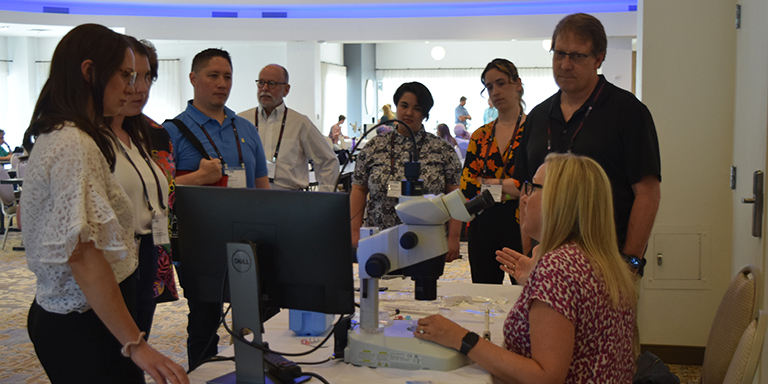
Newsletter
Special Interest Group of the American Association of Bioanalysts (AAB)

Legal Considerations when Responding to the COVID19 Pandemic
Danielle Holley Tangorre
The COVID-19 pandemic has caused unprecedented questions regarding how to operate one’s business. As IVF clinics face questions from their patients regarding continuation of treatment amid the myriad stay at home orders, the question becomes what are the risks and compliance concerns for a clinic if the decision is to continue to provide treatment. There are several competing factors that each clinic must assess, including the safety of patients and staff and each state’s stay at home orders. COVID-19 presents difficult questions given its high virulence, rapid transmission, and the expanding understanding of asymptomatic transmission.
First, clinics must review their state’s stay-at-home order(s). Many states have issued stay-at-home orders that may impact the ability to continue to provide treatment, or at least some forms of treatment. For example, Colorado issued Executive Order 2020 009, which directed that “all voluntary or elective surgeries or procedures, whether medical, dental, or veterinary, are suspended in the State of Colorado until April 14, 2020 at the earliest. A voluntary or elective surgery or procedure means that the surgery can be delayed for a minimum of three months without undue risk to the current or future health of the patient as determined by the guidelines developed by the…relating medical facility.”1 New Jersey also issued an executive order that suspended elective surgeries in order to protect health care providers, patients and staff from exposure and to conserve critical resources such as PPE2. Other states have similar orders that must be reviewed. New York also issued Executive Order 202.10 that directed facilities to cancel all elective surgeries and procedures as the Commissioner of Health defines.3 However, on April 7, 2020, the New York State Department of Health issued a guidance to clarify that “the Department considers sexual and reproductive health services an essential service.”4 The NYS Department of Health specifically included fertility services as essential.
While infertility is a disease, a clinic must review each patient and determine at this time whether certain conditions are urgent or can be delayed for a few months. For example, while New York deemed fertility treatment essential, NY still encouraged consideration to postpone those non-essential surgeries and procedures, even fertility procedures, to help reduce the use of hospital resources.5 It is important that clinics establish protocols to uniformly assess what conditions trigger an urgent consideration for continued treatment and then look to patient specific variables. Some states may even require such documentation as part of their stay-at-home order. In addition, policies should be adapted for telehealth and maintain privacy of patient records. For those non-urgent cases where an individual can be counseled, it is important that clinics consider and adopt secure telehealth platforms. During this pandemic, the Office of Civil Rights has relaxed the rules regarding HIPAA as it relates to telehealth to encourage such use. Each clinic that desires to treat in this manner, should create a telehealth and telework policy to foster continued treatment but keep data and information secure.
If that state order does allow for continuation of services in the clinic, it is important to review the clinic’s operating procedures, guidance from the CDC and OSHA regarding the safety of the workplace. There is potential liability for failure to take proactive and appropriate steps to protect patients and employees from COVID-19. As a general matter, physicians have an obligation to exercise reasonable care towards their patients. Over the years, there have been cases where providers have been sued for failure to protect patients from contagious diseases or to warn them. As such, it is critically important to monitor patients and staff as set forth in the CDC recommendations and to follow social distancing and other requirements.
In addition, there is potential liability for clinics to their employees if services are continued. Recently, Walmart was sued by an employee’s family in a wrongful death suit because it is claimed that the employee contracted COVID-19 at work and Walmart failed to exercise reasonable care in protecting its employees.6 The family is alleging claims of wrongful death, negligence, willful and wanton misconduct and violation of a state statute for the alleged failure of Walmart to screen employees and properly sanitize and otherwise protect its employees. In some states, OSHA is showing up for surprise inspections related to COVID-19 and have the authority to shut down a business or otherwise levy hefty fines. OSHA, pursuant to Section 5(a)(1) of the Occupational safety and Health Act of 1970, requires employers to provide a “place of employment, which are free from recognized hazards that are causing or are likely to cause death or serious physical harm.” OSHA has recommendations at this time that should be reviewed and incorporated into current policies. Finally, there is also debate that if an employee contracts COVID-19 in the workplace, that individual may be eligible for workers’ compensation coverage, which can greatly impact the clinic’s premiums. Each of these are separate considerations that require due diligence for a clinic to consider if continuing to provide services. As such, review of protocols and revisions to them during this pandemic are critically important.
Finally, regardless of whether treatment is continued for patients, clinics have an obligation to ensure the safety of cryopreserved oocytes, sperm and embryos. Each clinic should review their emergency plan and ensure that considerations are given for the safe keeping of the storage tanks and the safety of the personnel that are monitoring the tanks.
It is unprecedented times and open communication with patients and staff is critical. Each clinic must review their emergency policy and their operating policies and update, where appropriate, to ensure that the health and safety of everyone is of paramount concern.
References:
- Colorado Executive Order D 2020 009, available at https://drive.google.com/file/d/1Sp3le5zUavA3GKM_omeDXpm7FNfL-wSt/view
- NJ Executive Order 109, available at https://nj.gov/infobank/eo/056murphy/pdf/EO-109.pdf
- NY Executive Order 202.10, available at https://www.governor.ny.gov/sites/governor.ny.gov/files/atoms/files/EO_202.10.pdf
- Health Advisory: Sexual and Reproductive Health Services During the COVID-10 Public Health Emergency, available at https://coronavirus.health.ny.gov/system/files/documents/2020/04/doh_covid19_sexualreproductivehealthadvisory_040820-technical-correction.pdf
- Id.
- Evans v. Walmart, Inc. and J2M-Evergreen, LLC, 2020L003938 (Cook County, IL, 4/6/2020)
CRB News Articles
4/21/2020
Vol 9, No. 2
04/23/2020
Legal Considerations when Responding to the COVID19 Pandemic
04/23/2020
What is the Goal of Instrument Qualification?
04/23/2020
Be on the Lookout for an Important Survey Coming Your Way Soon!
04/23/2020
Are You Considering Becoming Board Certified? You Have Our Support
04/23/2020
Deadline for Recording Continuing Education Extended
04/23/2020
AAB/PEER Approved Continuing Education Programs
CRB Standing Rules - Log in to view



